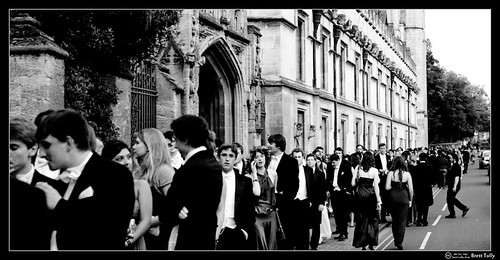Fellow academics and friends, I need your help.
Late last week, I was out at dinner when someone, who shall only be known as 'businessman', asked me the question I have been asked since the first few months of starting my thesis, 'What are you going to do next?' I tried to explain my academic plans, pointing out that it was hard for me to be as concrete as I would like because I am not entirely sure myself and that, given the nature of the work, the next years may well be spent in different positions and at different universities, but that all depended on whether I wanted to focus on teaching or research. I also tried to make it light-hearted, saying with as warm a smile as I could muster: 'You will definitely be one of the first people who knows all this when I know.'
But the conversation became very tense. Businessman made these sorts of comments (acccompanied by irritated facial expressions): 'If I were you, I would just change careers'; 'Academics have to spend so long applying for jobs when you are already so qualified, and then you have to beg for research grants and write articles for free'; 'I am used to people being paid well for what they do'; and 'I say all this because I am just wondering how you are going to pay for food and a roof over your head.' There were many other little chestnuts, which I am sure you can substitute with your own versions.
Unfortunately, at the time, I was already feeling bothered by the stupidly-generous supply of chilli in my pasta, heavy red wine, and the muggy, overcrowded Italian restaurant. I had also felt my day's takings (or word count) had been pretty lame. In short, I had taken a small amount of emotional baggage to dinner (just carry-on, nothing too fancy). Hot cheeked and troubled, a much as I wanted to, this all meant I simply couldn't articulate a grand defence of the academic enterprise.
Plus, so many themes filled my mind at once: the nature and role of a liberal education; the joys, and, indeed, necessities of intellectual freedom; the connection between thought and action in human history; the teaching and research functions of a university - universities teach doctors and support scientists (if not medieval history, then surely the health argument would work!); academics and businesspeople are driven by different motivations and interests, but both tend to value autonomy and solving problems; the prevalence of scientific, policy-based research at universities etc; universities and the private sector work more and more in partnerships anyway - the distinction was no longer as rigid (not without some negative consequences); universities have had a vocational function longer than a liberal education one.
There was just so much going on at once, including a great need to burp. These were points serve slightly different arguments and use various units of analysis and I didn't know where to begin. Some of the arguments felt hackneyed, others too intensely passionate with a basket of garlic bread in between us. On top of this, I didn't really know whether I should start saying anything to someone who never enjoyed school in the same way I have. Then I was worried I was going to be unfair, to take some of my frustrations and uncertainties about my thesis and future out on him in some twisted adaptation of the Stockholm syndrome. I was also aware that I might say something spectacularly snarky and sound like one of those obnoxious 10 year old whizz kids who shut down adults by pointing out how narrow their vocabularies are compared to theirs. I hate little kids like that. I want to remind them that they are still scared of the dark. I didn't want to leave and realise that rather than have a conversation, I had just been a little snob and, more than likely, somewhat insincere since, as much as I enjoy and appreciate what I do, I don't feel completely starry-eyed about the academic life (almost...but not quite!). I think I blurted (or burped) out something about how terribly stunted and boring the world would be if everyone wanted to be a businessperson. But I still didn't actually say much about academia itself.
To be fair to myself, it's also incredibly difficult to find the space to make careful arguments with someone who is scowling at you like you're a wastrel, and it's not always impressive, let alone useful, to rely on academic debates (such as the liberal versus vocational versus overlap debate) to someone who doesn't care for them. When someone tells you, essentially, that what you do is nonsensical, rather than cheerfully helping them understand it, it's actually very hard not to start acting like a childish patriot: all emotion, all defensiveness, all indignation. I think I sounded (or at least felt) a bit like one of those painfully dull people in the queue who you overhear telling someone how their home country is better than another.
When I made it home, I turned to my oracle, the magical interweb, to see what had been written about this and whether I could pull out something to send him. I have already read a lot on 'What is a University?' for a course I did, but this literature is written for an academic audience and will not do. I searched everything from 'What is the value or academics'/'academia', 'In defence of academia', 'Academia's role in society' to 'Why business people hate academics' and various combinations. But I have yet to find anything suitable. The closest thing I have found is a list of
advantages and
disadvantages of an academic career. Some of the items of this list are useful: rewarding and meaningful work, flexibility, being able to write, working with and meeting interesting people etc., but I am still not sure how to explain these things to someone who may not see these things as inherently true, let alone valuable and, of course, there are a whole lot of other things that have to be accounted for: time delays, increasing managerialism, prevalence of 'nutjobs' (as they are called in the lists above) and the prospect of slaving over an article that then has a mere 24 month shelf life. Morever, some of these are more about being an academic, rather than the broader value of academia.
I imagine because I am from a family where going to university was a taken for granted assumption and where the value of academia is tacit, I haven't ever had to master the answer to the question of why I value academia from someone who regards the endeavour as pointless or at least inefficient, indulgent and possibly a little intimidating. Plus, I am not sure how to account for the fact that I rely on the products of non-academic entrepreneurialism (presuming it can ever be fully separated) all the time. How much integrity do I need to make the arguments for academia? Also, do I need to take the high moral ground? Is academia going the same way as other professions where we simply shoo away tricky questions like these with the answer: 'It's just a job like anything else'? Whoops. I digress. These questions relate to bigger issues. For now, please let me know how you would respond to a routine encounter with businessman or any outsider for that matter being aggressively critical about what academics are and what they do.
The rules are:
- You have no more than 2 minutes time before outsider will change the subject or wave you off.
- You can't say something too harsh or arrogant as it will affect other relationships and make you feel bad.
- You have to see outsider again.
- Internal, esoteric arguments are more or less meaningless to outsider.
- Outsider's criticisms are not especially well-constructed and may move and remould elsewhere as you proceed. Outsider does not argue in the same way you do.
- You have tried humour or simply ignoring these comments many times before and would prefer a different approach (but would be willing to try it again if the only option, just need more material or motivation).
Also, if you have any come across or written any pieces of writing on this, please do send me the links.
Thank you and good night.


















